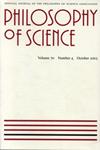性别与性选择(模型)有什么关系?
IF 1.4
2区 哲学
Q1 HISTORY & PHILOSOPHY OF SCIENCE
引用次数: 0
摘要
性别通常被认为是生物学的基本范畴——许多有性繁殖的生物都属于雌性/雄性的范畴。许多研究旨在解释两性之间的差异。性选择形成了解释性别间特征“典型”分布和解释导致“逆转”的环境的核心框架。我认为性选择模型不需要使用性别,性别在这种模型中缺乏解释意义。我提出了一个生殖二态性的框架,并认为它比性别的框架更好,因为它(I)与性选择的解释更兼容,(ii)允许它们更大的适用性。本文章由计算机程序翻译,如有差异,请以英文原文为准。
What do Sexes Have to do with (Models of) Sexual Selection?
Sexes are normally taken to be fundamental categories in biology – many sexually reproducing organisms fall under the categories of female/male. Much research aims at explaining differences between sexes. Sexual selection forms a central framework for explaining “typical” distributions of traits among sexes, and explicating circumstances leading to “reversal”. I claim sexual selection models needn’t make use of sexes, that sexes lack explanatory significance in such models. I offer a framework of reproductive dimorphism and argue it’s better than that of sexes, because it (i) is more compatible with explanations of sexual selection and (ii) allows for their greater applicability.
求助全文
通过发布文献求助,成功后即可免费获取论文全文。
去求助
来源期刊

Philosophy of Science
管理科学-科学史与科学哲学
CiteScore
3.10
自引率
5.90%
发文量
128
审稿时长
6-12 weeks
期刊介绍:
Since its inception in 1934, Philosophy of Science, along with its sponsoring society, the Philosophy of Science Association, has been dedicated to the furthering of studies and free discussion from diverse standpoints in the philosophy of science. The journal contains essays, discussion articles, and book reviews.
 求助内容:
求助内容: 应助结果提醒方式:
应助结果提醒方式:


